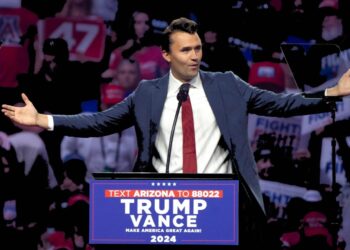Bannon: "The Coverage Yesterday Of The Mainstream Media Was The Worst I’ve Ever Seen”
Steve Bannon discussed President Trump’s recent efforts to negotiate an end to Russia’s war in Ukraine, highlighting a long Air Force One call with Ukrainian President Zelensky and EU leaders. Bannon criticized Ukraine’s corruption and Zelensky’s consolidation of power, while noting Putin demands a comprehensive peace deal rather than a ceasefire. He warned against the U.S. overcommitting financially or militarily to Ukraine, emphasizing that Europe should bear reconstruction costs. Bannon framed this as part of the "America First” approach, arguing the U.S. should focus on domestic needs and hemispheric defense rather than entanglement in European conflicts.
Pt.1:
Bannon On The Ukraine Conflict: "This Is The Globalists And The Globalist Media That Started This War”
Pt.2:
Rickards On Putin: "When He Says Something Believe Him, You Don’t Have To Agree, But You’ve Gotta Believe What He’s Saying”
Steve Bannon and Jim Rickards discussed President Trump’s recent interactions with Vladimir Putin, emphasizing that while a full peace deal in Ukraine is unlikely, the summit provided critical unfiltered communication. Putin reportedly signaled a willingness to relax some territorial demands, but his conditions—demilitarization of Ukraine, no NATO membership, and retention of Crimea and certain eastern regions—remain largely unchanged. Trump’s priority was to initiate a structured peace process without agreeing to unfavorable terms.
Rickards highlighted the European dependence on U.S. military and financial support, warning that attempts to involve American troops under Article 5-style guarantees risk escalating into direct conflict with Russia. Both noted that Europe lacks the military capacity or financial resources to sustain the war independently, making the U.S. the primary enabler of European objectives.
Bannon criticized the media for presenting unrealistic expectations, framing Trump as failing if immediate results were not achieved, and emphasized that Trump’s measured approach protects American interests while acknowledging the complex realities on the ground. He also stressed that Ukrainian forces’ heroism is real, but the war is heavily enabled by U.S. technology and intelligence support. The key next step is coordinating with Zelensky while resisting overcommitment to European-driven demands.
Posobiec: Mainstream Media Doesn’t Understand The Shared History And Shared Sacrifice Of The U.S. And Russia
Steve Bannon and Jack Posobiec discussed President Trump’s Alaska meetings with Vladimir Putin, emphasizing the media’s petty coverage of symbolic moments like Putin’s World War II references. They praised Trump for maintaining focus, working nonstop during the six-plus hour flight back, and handling multiple calls with NATO, EU leaders, and Zelensky, pushing the peace process forward. Bannon stressed that Trump cannot unilaterally order a ceasefire; any agreement requires Russian and Ukrainian cooperation. The conversation also highlighted the media’s predictable invective, attacking both Trump and Putin, while ignoring the serious, high-stakes diplomacy unfolding behind the scenes, where the president exercised discipline, strategy, and leadership.
Fanell: "We’ve Gotta Get Our Act Together On Dealing With The People’s Republic Of China”
Captain Jim Fanell joined the discussion with Steve Bannon to address America’s strategic posture in the Pacific, emphasizing the Chinese Communist Party (CCP) as the existential threat. Fanell noted that while Europe has historically shirked responsibility, the U.S. has shouldered global security burdens, citing recent deployments of carrier strike groups to both the Middle East and the Pacific. He criticized NATO nations for sending carriers to the Pacific instead of protecting vital chokepoints, leaving America to handle multiple crises simultaneously.
Fanell praised President Trump for shifting U.S. focus back to China, calling it a critical correction after decades of engagement policies that enriched China at America’s expense while exposing vulnerabilities, including fentanyl trafficking. He condemned the media’s hypocritical criticisms, framing them as attacks on Trump rather than assessments of strategy.
Drawing on his intelligence experience tracking Soviet submarines and Russian long-range bombers, Fanell stressed that relationships with Russia and China are vital, noting Russia’s nuclear arsenal and China’s growing strategic influence. He argued that Trump is taking the necessary steps to prioritize America’s national security, reorienting the whole-of-government approach toward the CCP. According to Fanell, decisive action is overdue, and the U.S. must finally "get our act together” to address China’s 35-year buildup of power and influence.




![Bannon’s WarRoom, Show Clip Roundup 11/4/2024 [AM]](https://warroom.org/wp-content/uploads/2024/11/bannonsteve_022424gn06_w-350x250.webp)